Exploring Jebel Ali: Key to Dubai's Urban Development
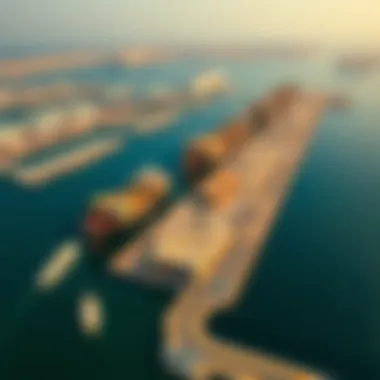
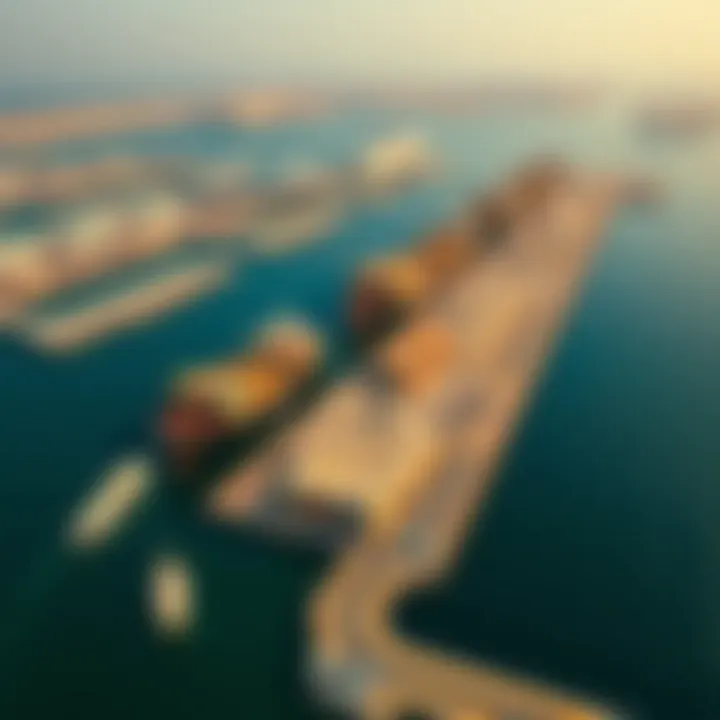
Intro
Jebel Ali stands as a notable gem within the bustling urban environment of Dubai, playing an instrumental role in the emirate's growth. Known for its strategic port and the unique blend of residential and commercial spaces, this locality has carved its niche in the broader skyline of Dubai. In the coming sections, we will unravel the multiple layers that form the essence of Jebel Ali. This encompasses its historic importance, current real estate developments, and what the future holds for this vibrant region.
As Dubai continues to evolve at a remarkable pace, keeping an eye on areas like Jebel Ali becomes critical. It is not just another spot on the map; it is a dynamic entity, affecting investors, potential homebuyers, and even the everyday community. By understanding Jebel Ali’s market nuances and the lifestyle it offers, one can navigate the complexities of Dubai's real estate landscape with confidence.
Market Insights
Latest Trends in Dubai Real Estate
The real estate market in Dubai has shown a remarkable resilience, especially in areas like Jebel Ali. One of the latest trends is the increasing demand for mixed-use developments, where residential, commercial, and leisure spaces coexist. This shift is evident in Jebel Ali, with new projects underway aiming to integrate living, working, and entertainment in a seamless fashion.
Moreover, luxury residences are gaining traction, catering to expatriates and locals alike who seek upscale living options. The focus on sustainability is also creeping into real estate practices, leading to the development of eco-friendly properties that align with modern environmental standards. As an investor, recognizing these trends is key for maximizing returns.
Impact of Global Events on Local Market
Global events inevitably shape local markets. The recent recovery from the pandemic has unleashed pent-up demand in the Jebel Ali area, as businesses bounce back and expatriates return. Furthermore, Dubai's positioning as a safe haven for investment attracts buyers from around the world, infusing fresh capital into the market.
Key upcoming events, like Expo 2025, promise to magnify interest in Jebel Ali. This global showcase will not only spotlight the region but also enhance its reputation as a hub of innovation and culture, which in turn can lead to an uptick in property values.
"Understanding the waves of change in global economics is crucial for anyone operating in Dubai's real estate markets. One must remain adaptable to stay ahead."
Investment Opportunities
High-Return Areas for Property Investment
When it comes to identifying high-return locales within Jebel Ali, several neighborhoods stand out. Properties near the Jebel Ali Free Zone are particularly attractive for investors, as they benefit from proximity to businesses engaged in shipping, logistics, and trade. Similarly, developments adjacent to the Jebel Ali Beach offer lucrative rental prospects due to their prime location and lifestyle appeal.
In 2023, the demand for warehouses and industrial spaces in Jebel Ali has surged, driven by the e-commerce boom. Investing in commercial properties in this sector can yield significant returns as companies seek to establish a presence in Dubai.
Tips for First-Time Investors
For those entering the Dubai market for the first time, here are a few strategies:
- Do Your Homework: Research the local market trends and neighborhood dynamics carefully.
- Focus on Quality: Invest in properties from reputable developers with a track record of delivering projects.
- Consider Rental Yield: Look closely at areas with high rental yields to ensure optimal return on your investment.
- Network with Experts: Engaging with local real estate agents and attending property exhibitions can provide valuable insights.
Prelude to Jebel Ali
Jebel Ali stands as a testament to Dubai's relentless growth and forward-thinking approach to urban development. It’s not just an area but rather a burgeoning metropolis that plays a crucial role in the economic and social fabric of Dubai. Understanding Jebel Ali is essential, especially for investors, homebuyers, agents, and developers who are keen to navigate the real estate landscape here.
In this section, we will touch on various aspects such as its geographical location and historical development. Both of these elements intertwine to create a unique character for Jebel Ali, illustrating why it’s become a vital component of Dubai’s urban narrative.
Rather than merely a location on a map, Jebel Ali serves as a crucial juncture for trade and logistics, as well as an attractive option for residential and commercial investment. As we delve into the specifics, it becomes clear that this area encompasses a lot more than just its famous port. The balance of its rapidly developing infrastructure and community lifestyle offers a glimpse into the future of urban living in the region.
Geographical Overview
Jebel Ali is geographically situated 35 kilometers southwest of Dubai’s city center, conveniently positioned near the coast. In fact, its proximity to the Arabian Gulf makes it an ideal spot for maritime activities, including shipping and trade, facilitated mainly through the Jebel Ali Port, one of the world's largest artificial harbors. This geographical advantage not only nurtures global trade but also encourages diverse industries to establish a foothold in the area.
The landscape of Jebel Ali is predominantly flat, enriched with sandy dunes and developing neighborhoods that give it a mix of modernity and traditional influences. The topography allows for extensive infrastructure projects, helping to accommodate both commercial and residential properties. There are also many green spaces and recreational areas which work wonders in enhancing the quality of life for residents. This geographical context is integral, as it lays the groundwork for understanding Jebel Ali’s economic and social relevance.
Historical Development
The story of Jebel Ali is not merely one of contemporary growth, but it’s also steeped in a layered history that dates back to the early days of Dubai's economic transformation. Initially, the area was primarily inhabited by fishing and pearl diving communities, reflective of Dubai's maritime heritage. However, the turning point arrived in the late 20th century, when Jebel Ali was developed to support the ambitions of Dubai to become a global trade and logistics hub.
The establishment of Jebel Ali Port in 1977 marked a significant milestone. It was an ambitious endeavor that reflected the visionary leadership of Sheikh Rashid bin Saeed Al Maktoum. Over time, the port has not only bolstered local and international trade but also attracted numerous businesses to set up shop. The surrounding Free Zone has become a magnet for foreign direct investment, allowing companies to thrive with tax incentives and infrastructural support.
In tandem with these industrial advances, the residential offerings have also expanded significantly. The construction of varied housing options has occurred in parallel with commercial developments, aiming to meet the demands of a growing workforce and expatriate community. Jebel Ali has transformed from a small fishing village into a vibrant urban locale that symbolizes Dubai’s remarkable evolution.
Understanding both the geographical and historical context of Jebel Ali sheds light on its current significance. Clearly, the trajectory of this area is indicative of broader trends within Dubai and showcases how strategic planning and vision can shape urban landscapes.

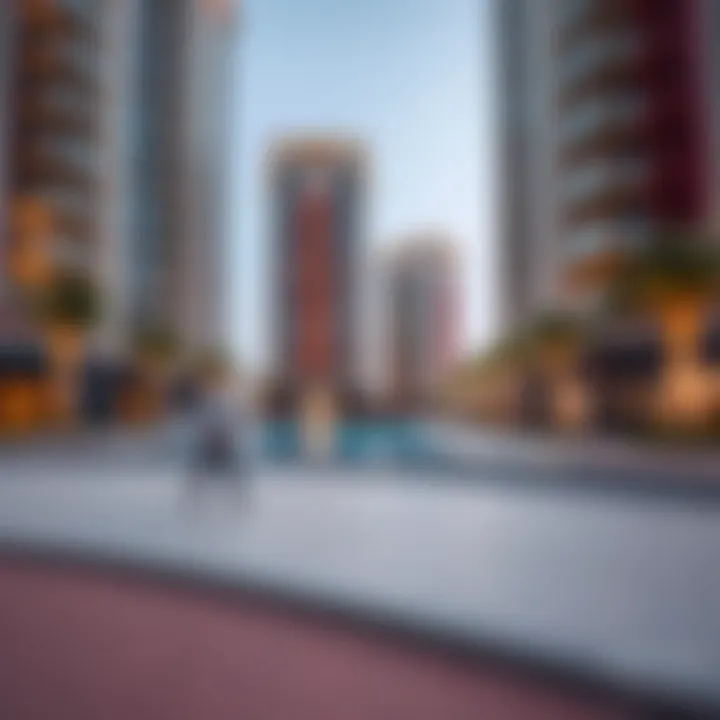
Strategic Importance of Jebel Ali
Jebel Ali stands as a crucial cog in the intricate machinery of Dubai's urban framework. Its strategic location and significant developments make it not just a geographical point on a map, but a vibrant hub that pulsates with economic activity. By examining the various facets of Jebel Ali, one can appreciate the profound influence it has on regional and global trade, as well as its contributions to the economy and community at large.
Global Trade and Logistics Hub
Jebel Ali is synonymous with global trade; it's like the beating heart of Dubai's commerce. The Jebel Ali Port is one of the largest and busiest ports in the Middle East, handling a staggering amount of cargo every year. Its importance cannot be overstated. The port serves as a gateway for goods entering and leaving the region, playing a pivotal role in supply chains that span continents.
What makes this port truly exceptional are its state-of-the-art facilities. Equipped with cutting-edge technology and efficient operations, it ensures that ships can dock, unload, and set sail in record time. This efficiency boosts the overall logistics of trade, benefiting various industries—including automotive, electronics, and textiles. Businesses get quicker access to markets, and consumers enjoy a broader array of choices.
- Cargo Capacity: The port can handle millions of TEUs (twenty-foot equivalent units) annually, proving its capacity to cater to growing trade demands.
- Free Trade Zone: The Jebel Ali Free Zone Authority (JAFZA) complements the port's operations. Companies established within the free zone enjoy various incentives, including tax exemptions and customs privileges, making it an attractive space for multinational corporations.
This combination of infrastructure and policy creates a robust ecosystem that not only attracts companies but also positions Jebel Ali as a focal point for international business.
Economic Contributions
Digging deeper into Jebel Ali’s role, its economic contributions are substantial. The area is a significant job creator, providing employment opportunities across various sectors, which fuels local economies. Its development has resulted in a surge of investments, both local and foreign.
- Investment Attraction: Foreign investors flock to this region, lured by the promise of growth. The government’s commitment to enhancing infrastructure and business opportunities tags Jebel Ali as a lucrative destination for real estate and commercial ventures.
- Impact on Local Businesses: Local enterprises thrive due to the high influx of businesses in the vicinity. From logistics providers catering to freight movements to eateries servicing the workforce, the economic ripple effect is palpable.
“The robust growth witnessed in Jebel Ali over the past few decades is a testament to Dubai's vision of establishing itself as a premier global trading hub.”
Moreover, by driving economic diversification, Jebel Ali plays a vital role in bolstering Dubai's efforts to reduce its reliance on oil revenues. Long-term initiatives are in place to promote sectors like technology, renewable energy, and tourism, increasing the area’s overall economic resilience.
In summary, the strategic importance of Jebel Ali transcends beyond mere geography; it's intertwined with economic vitality and global connectivity, shaping not just Dubai, but the broader region with its ambitious endeavors.
Real Estate Market in Jebel Ali
The real estate market in Jebel Ali holds significant importance within the larger narrative of Dubai's growth and urban development. As a pivotal area characterized by its expansive port and proximity to various economic zones, Jebel Ali presents numerous opportunities for both investors and individuals alike. The continuous evolution of this locale reflects the dynamic nature of Dubai's real estate sector, making it a point of interest for many stakeholders, from expatriates to seasoned investors.
Current Market Trends
In recent years, Jebel Ali has seen a noticeable shift in its real estate landscape. The demand for properties has steadily increased, driven by various factors including the upgrading of infrastructure and the influx of businesses setting up operations in the region. Here are a few trends that stand out:
- Rental Demand: With more expatriates moving to this area for work, the rental market has noticeably expanded. This trend is particularly reflected in the lease prices of residential properties, which have seen modest growth.
- Commercial Spaces: The demand for warehouses and logistics facilities continues to rise, fueled by Jebel Ali's strategic location. This demand underscores the appeal of this area for companies involved in trade and supply chain management.
- Sustainability Focus: Many new developments are emphasizing sustainable designs and eco-friendly amenities, aligning with global initiatives toward greener urban environments.
Types of Properties Available
Jebel Ali's property market offers an extensive range of options, catering to diverse needs and price points. Key property types include:
- Apartments: Suitable for families and singles, these properties often come with amenities like pools and fitness centers, appealing to a wide demographic.
- Villas: For those desiring more space and privacy, villas are available in various sizes, many featuring private gardens or pools.
- Commercial Spaces: These include offices, warehouses, and retail outlets positioned strategically within economic zones, ideal for businesses seeking visibility and accessibility.
- Mixed-Use Developments: Combining residential, commercial, and leisure spaces, these developments foster community living while providing convenient access to essential services.
Investment Opportunities
Investing in Jebel Ali's real estate market presents a mix of potential benefits and considerations. Noteworthy opportunities include:
- High Rental Yields: With the rising demand for rental properties, landlords can expect favorable yields, making it an attractive option for property investors.
- Capital Appreciation: Given Jebel Ali’s strategic importance and ongoing developments, property values in this area are likely to appreciate over the years, enhancing overall investment returns.
- Regulatory Incentives: The government has implemented favorable regulations focusing on foreign investments in real estate, simplifying the process for non-residents.
- Diversification in Portfolio: Jebel Ali offers a unique blend of residential and commercial properties, allowing investors to diversify their portfolios and risk levels.
"Investing in Jebel Ali is not just about finding a property; it’s about grasping the opportunities tied to one of the most strategic areas in Dubai."
Living in Jebel Ali
Living in Jebel Ali isn't just about the buildings and streets; it's an experience shaped by a close-knit community and a range of amenities that cater to both comfort and convenience. This area stands out due to its unique blend of residential options and commercial opportunities, making it a sought-after destination for expatriates, investors, and homebuyers alike. With Dubai's ever-growing landscape, understanding what Jebel Ali offers is crucial.
Community Lifestyle
The community lifestyle in Jebel Ali reflects a melting pot of cultures and traditions. With a medley of nationalities calling this area home, residents enjoy a rich cultural tapestry. The local vibe is lively yet relaxed, promoting a sense of belonging among neighbors.
"Jebel Ali is not just a place to live; it's a place to thrive and connect with others who share similar values."
Social gatherings and community events are common, fostering friendships and networks that can last a lifetime. There are parks and communal spaces where families come together, and recreational activities are available for people of all ages. Living here means embracing a lifestyle where every weekend might bring new friends over for a barbeque or engaging in community sports.
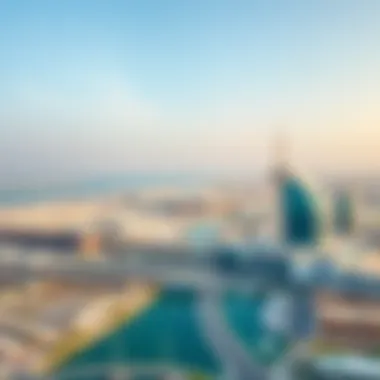
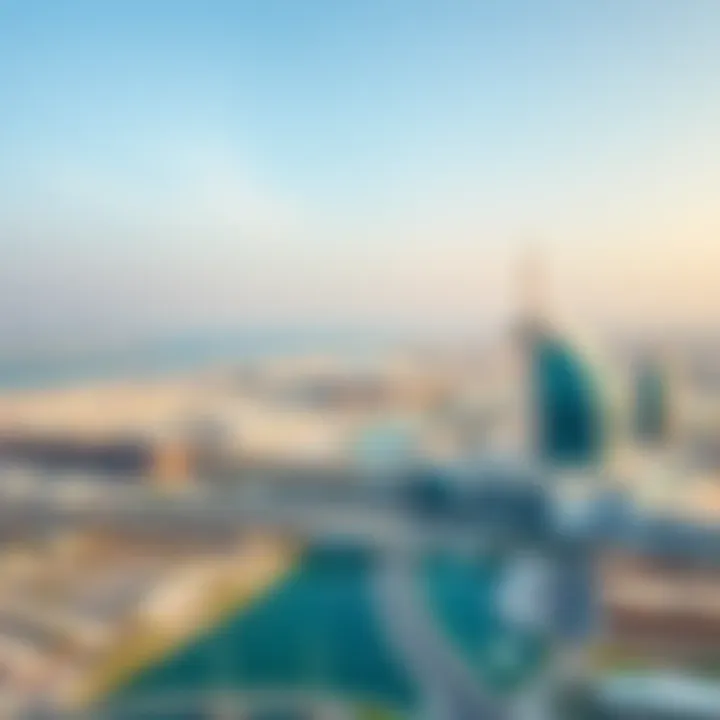
Amenities and Services
Jebel Ali prides itself on its vast range of amenities and services that meet the everyday needs of its residents. From grocery stores to international restaurants, everything is within arm's reach. Let's break down a few noteworthy aspects:
- Shopping: The area hosts various shopping outlets, including giant retail chains like Ibn Battuta Mall and Dubai Marina Mall, providing everything from luxury items to daily groceries.
- Recreational Facilities: For those who enjoy an active lifestyle, Jebel Ali features fitness centers, swimming pools, and sports clubs that encourage a health-conscious living.
- Healthcare: Proximity to quality healthcare is crucial. Residents have access to reputable clinics and hospitals, ensuring that health services are never far away.
- Dining Options: Food lovers will find diverse culinary scenes, ranging from traditional Middle Eastern delicacies to modern Asian fusion cuisine.
These amenities contribute significantly to a balanced way of life, where convenience and quality go hand in hand.
Educational Institutions
Education is a key consideration when choosing a place to live, especially for families. Jebel Ali offers several reputable educational institutions that cater to children of different ages and backgrounds. The availability of internationally recognized schools and nurseries means parents can choose an educational path that aligns with their values and expectations.
- International Schools: Schools such as Jebel Ali School and Regent International School offer curricula that cater to expatriate families, including the British and American systems.
- Preschools: For younger children, there are numerous nurseries that focus on early childhood development in supportive environments.
- Community Learning Programs: Beyond formal institutions, residents can also participate in community-led learning sessions, workshops, and extracurricular activities that cultivate lifelong skills and interests.
Transport and Accessibility
The accessibility of Jebel Ali is significant, serving as a crucial artery in phase of Dubai's urban layout. With the region being not just an industrial and residential hub but also a bustling port zone, understanding its transport framework sheds light on how people and goods move around. In this section, we dissect the infrastructure and public options that contribute to Jebel Ali’s connectivity, further establishing its role as a key player in the economic and social aspects of Dubai.
Road Links and Infrastructure
Road links in Jebel Ali are like the veins that carry life through a body. Primarily, Sheikh Zayed Road, which runs parallel to the area, is a significant highway connecting Dubai to Abu Dhabi and beyond. This road allows seamless car travel, making Jebel Ali accessible not only to daily commuters but also to those coming in from out of town. With multiple exits leading to various sectors within Jebel Ali, the traffic flow is typically well managed, ensuring smooth travel especially during rush hours.
In addition to highways, local roads have undergone consistent upgrades to accommodate the growing demand. The area boasts well-maintained roads that make getting around straightforward, whether you’re heading to work or planning leisure activities. Notably, infrastructure around the port area is also built to facilitate heavy-duty vehicles, showcasing the dual purpose of Jebel Ali as a commercial powerhouse.
There are significant projects on hand to improve road capacity and enhance connectivity with other parts of Dubai, further strengthening the transport network.
"Investments in infrastructure are at the heart of Jebel Ali's strategic development, as they not only boost local accessibility but also draw international interest."
Public Transport Options
When looking at Jebel Ali’s public transport options, one finds that diversity is key. The area is primarily served by the Dubai Metro and extensive bus services, catering to both local residents and visitors.
- Dubai Metro:
The Red Line of the Dubai Metro extends to the Jebel Ali station. This proximity to the metro system offers an efficient mode of transportation for those commuting to various parts of Dubai. The trains are known for their punctuality and cleanliness, allowing passengers a stress-free journey. - Bus Services:
In addition to the metro, Dubai's Roads and Transport Authority operates several bus routes that link Jebel Ali to other key neighborhoods in Dubai. This service is especially beneficial for residents who might not want to drive every day. Buses run frequently, providing a reliable option for public transportation. - Ride-Sharing:
For those preferring more personalized travel, ride-sharing apps like Careem and Uber are available, adding to the convenience of getting around. - Biking and Walking:
Recent developments have introduced cycling paths and pedestrian-friendly areas, promoting healthier transportation methods.
Public transport is not just a convenience but also an environmental responsibility in today’s world. In this regard, Jebel Ali is taking steps to reduce the carbon footprint by encouraging the use of public transport.
Environmental Initiatives in Jebel Ali
In recent years, Jebel Ali has become a forerunner in adopting environmental initiatives within the rapidly developing urban framework of Dubai. The importance of these initiatives cannot be overstated; they not only reflect the area's commitment to sustainable growth but also align with global trends pushing for greener solutions amidst increasing urban pressures. As investors, homebuyers, and other stakeholders look towards Jebel Ali, understanding the environmental landscape becomes paramount in making informed decisions.
Sustainability Projects
Jebel Ali has embarked on several sustainability projects aimed at minimizing the ecological footprint while enhancing the quality of life for its residents. These projects range from energy-efficient buildings to water conservation efforts.
- Green Building Standards: In alignment with the UAE's Vision 2021, developers in Jebel Ali are increasingly adopting green building standards. This includes using sustainable materials, optimizing energy efficiency, and integrating renewable energy sources such as solar panels.
- Waste Management and Recycling Programs: Local authorities have implemented effective waste management strategies, focusing on recycling and reducing landfill contributions. Residents are encouraged to participate in sorting waste at the household level, which is then processed through advanced recycling facilities.
- Water Conservation Initiatives: Efficient water usage is crucial in arid regions like Dubai. Projects promoting greywater recycling and the installation of water-saving fixtures are contributing significantly to reducing water waste in Jebel Ali.
These sustainability efforts not only honor the environment but also enhance the area's appeal to eco-conscious investors and residents, further boosting Jebel Ali's real estate prospects.
Impact on Local Ecosystems
The environmental initiatives in Jebel Ali extend to significant efforts aimed at preserving and enhancing local ecosystems. As Dubai grows, so does the risk to its natural habitats; however, concerted efforts are being made to mitigate these impacts.
- Habitat Restoration Programs: Local organizations are engaged in habitat restoration projects, particularly around coastal areas, promoting biodiversity and protecting marine life. Mangrove planting, specifically, is a notable endeavor, aimed at creating natural barriers against coastal erosion while providing safe havens for various species.
- Wildlife Protection: Regulations are put in place to protect local wildlife from the adverse effects of urban development. By ensuring wildlife corridors and sensitive habitats remain untouched, the natural balance can be preserved while still allowing for growth and modernization.
"In Jebel Ali, the focus on environmental sustainability presents a unique opportunity to merge economic growth with ecological stewardship, paving the way for a more resilient urban future."
One cannot overlook the importance of educating the community about these environmental initiatives. Workshops and awareness campaigns play a significant role in fostering a culture of sustainability among the residents. The collaborative nature of these initiatives encourages participation and cultivates a sense of responsibility towards the environment. As such, Jebel Ali stands not only as a beacon of progress but also as a model of how urban development can coexist harmoniously with nature.
Future Prospects of Jebel Ali
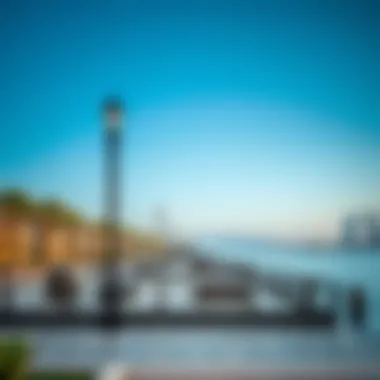
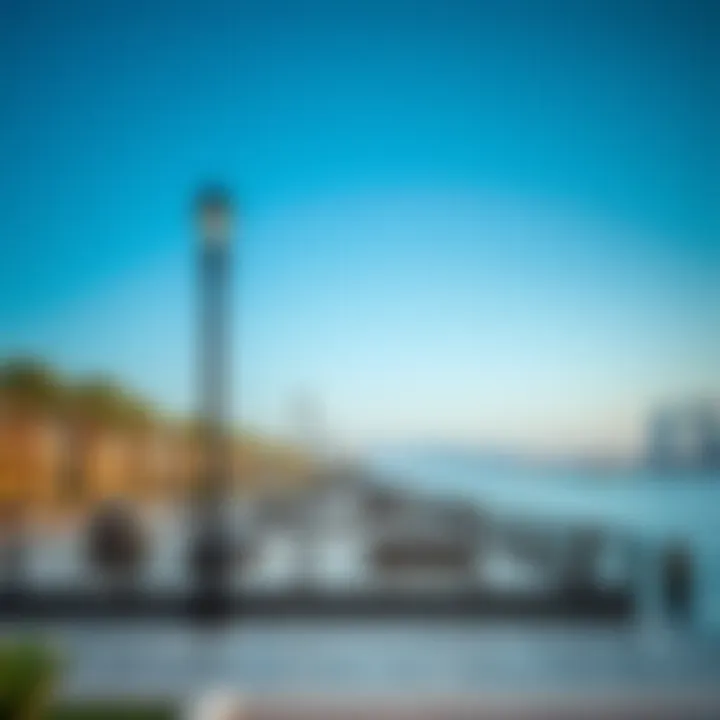
The future of Jebel Ali looks promising, shaping itself into an integral part of Dubai's urban development. As the city continues to expand, Jebel Ali is likely to play a crucial role in economic, social, and technological advancements. This area is not simply a locale; it's a canvas for ambitious projects that could redefine urban living and commercial interaction in Dubai.
Upcoming Developments
In recent years, several notable developments have been making waves in Jebel Ali. The plans for expanding the Jebel Ali Port and enhancing the adjacent Free Zone are high on the development agenda. These projects aim to bolster the area’s already significant position as a global trade hub. One cannot overlook the anticipated rise of smart city initiatives planned for the region. Such projects will likely incorporate advanced technologies to provide innovative solutions for business operations, community living, and environmental sustainability.
Moreover, with government initiatives focusing on sustainability, plans for parks, green spaces, and energy-efficient buildings are rolling out. Residents can expect a new urban environment that promotes an eco-friendly lifestyle while maintaining commercial viability. Through these developments, Jebel Ali seeks to attract a mixture of local businesses and international corporations eager to establish a presence in Dubai’s thriving market.
- Notable upcoming projects include:
- Smart Port Expansion: Enhancing the port’s capacity and efficiency.
- Residential Complexes: New housing units designed with state-of-the-art amenities.
- Commercial Offices: Spaces tailored for multinational companies to address their needs in the GCC region.
Economic Forecast
As one peers into the crystal ball of Jebel Ali’s economic prospects, the forecast is largely optimistic. The combination of rising global trade and ongoing investment in infrastructure makes for a robust economic outlook. Analysts predict steady growth fueled by the Free Zone's lifting of trade barriers and incentives for expatriates and investors.
In addition, the increase in population due to new residential and commercial developments is expected to spur local consumer spending. With more services catering to the growing community, from retail to entertainment, the economic cycle can only benefit. More residents mean more businesses and thus, more job opportunities.
The economic trajectory for Jebel Ali is not only about expansion but sustainability and innovation.
Investors might find particular interest in sectors such as logistics, hospitality, and retail. With a strategic location and a favorable operating environment, Jebel Ali is positioned to attract significant foreign direct investment in the coming years. Market predictions suggest robust returns for investors willing to tap into the area’s evolving landscape.
In summary, the future prospects of Jebel Ali are shaped by ambitious developments and a strong economic forecast that combined, promise to make this area a cornerstone of Dubai's growth narrative.
Challenges and Considerations
In any vibrant urban area like Jebel Ali, understanding the challenges and considerations becomes paramount. These factors can significantly affect the real estate dynamics, investment opportunities, and community living experiences. From regulatory frameworks to market competition, every aspect plays a crucial role in shaping the landscape. As investors, homebuyers, agents, developers, and expatriates delve deeper into Jebel Ali's potential, acknowledging these hurdles is essential.
Regulatory Environment
The regulatory environment in Jebel Ali holds substantial weight for anyone looking to invest or relocate here. Dubai, in general, has established a comprehensive legal framework to foster growth. However, the specifics can vary across regions, including Jebel Ali. Investors must familiarize themselves with local laws, zoning policies, and land use regulations to navigate these waters effectively.
Factors that need scrutiny include:
- Ownership Laws: Foreign investors must understand the rules of ownership, especially in freehold versus leasehold areas. Jebel Ali particularly has zones where foreign ownership is permissible, which can be a deciding factor.
- Business Licensing: Those considering commercial investments need to grasp the complexities of obtaining the necessary licenses and permits. The process can be burdensome for the uninformed, thus seeking legal advice is often prudent.
- Taxation Policies: Understanding the tax implications for individuals and businesses alike provides clarity on potential returns on investment. While many foreign investors benefit from tax-free zones, changes can always happen.
“Navigating the regulatory landscape is akin to threading a needle; one needs precision and knowledge.”
Market Competition
As Jebel Ali continues its growth and modernization, market competition becomes a prevailing factor. Various stakeholders, from established businesses to newcomers, vie for prime positions in a burgeoning market. Recognizing the competitive landscape helps in strategizing investments and understanding market behavior.
Key components of market competition include:
- Emerging Developments: As new properties and developments pop up, existing ones might face challenges in attracting buyers and tenants. Staying ahead means keeping an eye on the latest announcements and trends in the area.
- Pricing Strategies: The fluctuation of real estate prices is a critical element for buyers. Knowing what similar properties are listed for can help buyers negotiate better deals and ensure they are not paying over the odds.
- Quality of Services: The competition is not just in prices; service quality matters. Consumers today demand more than just a place to stay; they want community, amenities, and lifestyle choices. Thus, properties that fall short may struggle to maintain appeal.
As Jebel Ali's narrative unfolds, these challenges and considerations remain at the forefront, dictating future trends and decisions. By understanding these elements, stakeholders can better position themselves in this dynamic urban landscape.
End
Summary of Key Points
In closing, the multifaceted nature of Jebel Ali stands out as a significant contributor to Dubai's urban landscape. Its geographical positioning enhances its role as a global trade and logistics hub, particularly through the Jebel Ali Port—the largest man-made harbor in the world. The area’s historical development showcases expansive growth, evolving from a simple port into a bustling hub attracting both local and international investment. Key points covered throughout this article include:
- Geographical Overview: Jebel Ali's strategic location enhances connectivity, making it essential for trade.
- Historical Development: Understanding how Jebel Ali emerged from its roots provides context to its current significance.
- Economic Contributions: Not only does Jebel Ali contribute significantly to Dubai's GDP, but it also plays a pivotal role in employment opportunities.
- Real Estate Market: Trends indicate a vibrant property market influenced by expanding commercial activity and lifestyle options.
- Community Lifestyle and Amenities: The area offers a unique blend of comfort and conveniences, catering to diverse populations.
- Transport Infrastructure: Robust road links and public transport systems ensure accessibility for residents and visitors alike.
- Environmental Initiatives: Progressive sustainability projects show a commitment to preserving local ecosystems.
- Future Prospects: Ongoing developments promise continued growth, making it an enticing prospect for investors.
- Challenges: Understanding the regulatory environment and market competition is crucial for navigating investments.
Final Thoughts
Reflecting on the insights presented, Jebel Ali epitomizes the balance between past growth and future potential. It is not merely a geographic location; it symbolizes Dubai’s impressive vision for urban development. The integration of economic prowess with community engagement sets Jebel Ali apart from other regions. For investors, homebuyers, and expatriates, this area represents an opportunity that blends investment security with an enhanced quality of life. Looking ahead, as the region endeavors toward further enhancement of its infrastructure and sustainability measures, the prospects for growth appear promising.
In summary, whether one is eyeing investment opportunities or seeking a new home, Jebel Ali serves as a fascinating case study of how urban spaces can evolve and thrive in today's dynamic world. With its unique offerings and strategic importance, it remains a vital component of not just Dubai, but an integral element in the broader discussion of urban development in the Middle East.
"Jebel Ali is not just a place on a map; it's a narrative of growth, ambition, and lifestyle adaptation that reflects the dynamic spirit of Dubai."
For more information on Jebel Ali and its significance, you might find these resources useful:
- Dubai Government
- Wikipedia on Jebel Ali
- Britannica - Jebel Ali
- Expats in Dubai - Reddit
- Facebook Group for Dubai Investors



